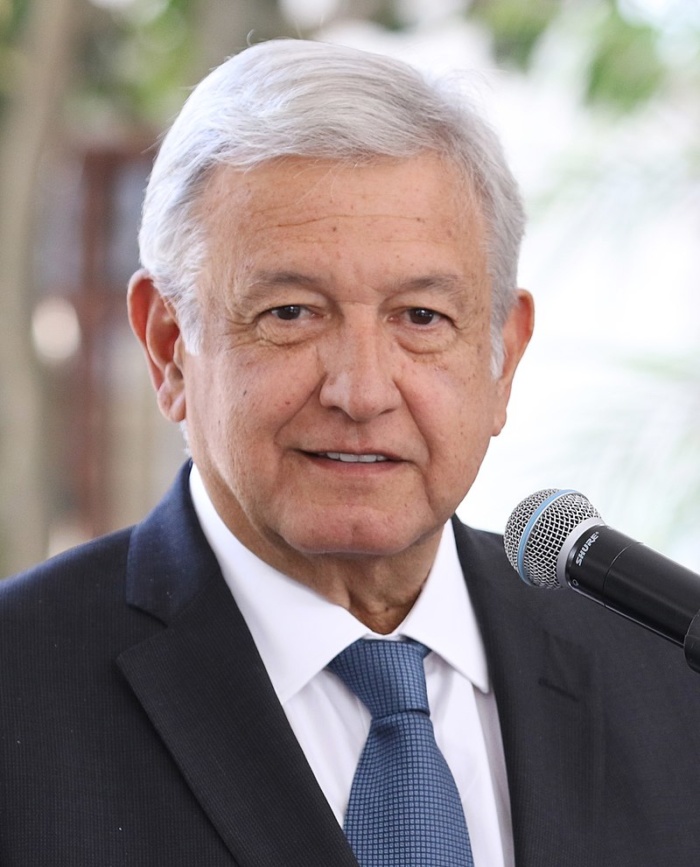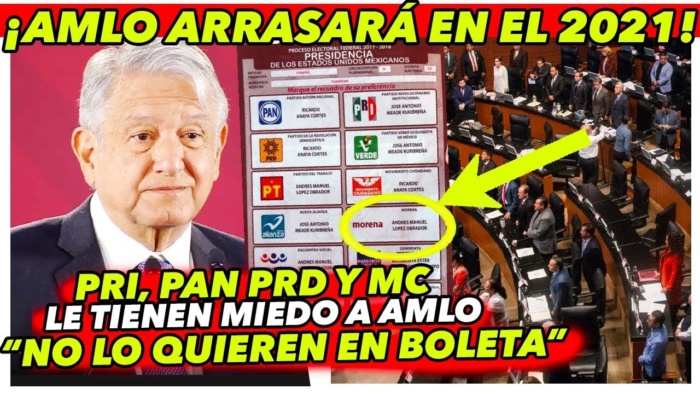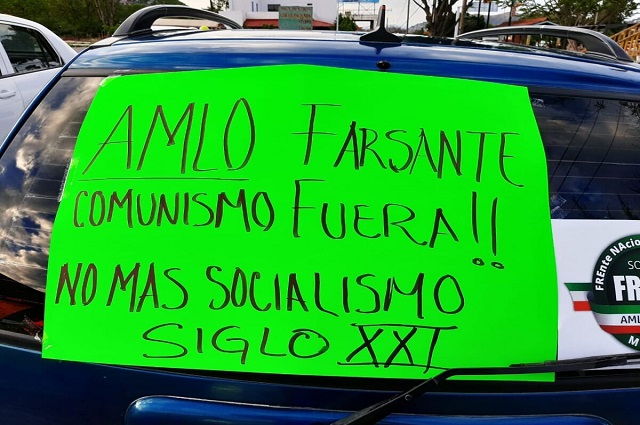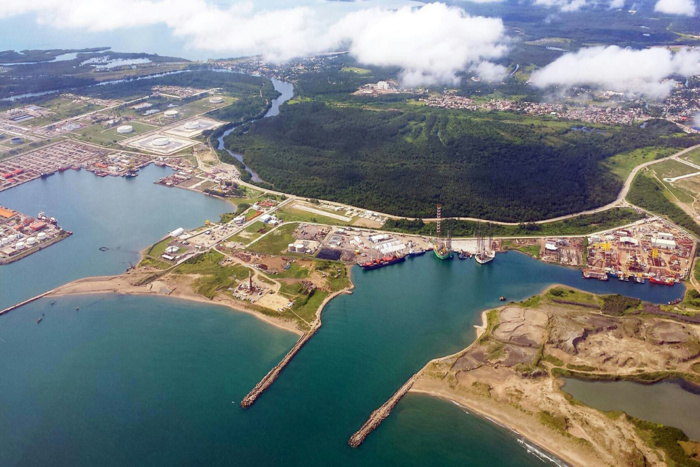This article was translated for LAB by Fuschia Fowke. You can read the original in Spanish here.
Preparations for Mexico’s 2020/21 elections began at the start of September. This is an exceptionally important and complex process, as more than 21,000 seats are to be contested, including federal deputies, local deputies, town councillors and 15 governorships.
It will be a test for the leadership of President Andrés Manuel López Obrador’s (AMLO), who has maintained high levels of popularity, despite the pandemic. To advance his political project he needs the continued support of legislative power and the governing party, the Movimiento de Regeneración Nacional (National Regeneration Movement or Morena) has the majority.

President López Obrador started the electoral race in a strong position; the daily newspaper El Financiero, recorded a rise in public support of three points (from 59 to 62 per cent) in its September monthly survey. This rise is attributed by some specialists as a response to the emergence of radical opposition groups, such as the self-styled Frente Nacional Anti AMLO (National Anti-AMLO Front or FRENA). It is also a result of the President’s continued good communication with the people who voted for him.
‘Somehow, he continues to have a good understanding of what the majority of Mexicans feel and he continues to address them in a way which generates hope,’ says Edna Jaime Treviño, director of México Evalúa (a think tank which evaluates and monitors government operations).

López Obrador has been involved in politics for many years and has travelled the country innumerable times, winning the backing of his supporters with social programmes that focus on the most vulnerable sectors of the population. It is among these sectors that the greatest support for his administration is found.
He has also established a narrative of participatory democracy, which promotes the idea that it is the people who make the decisions about the public life of the country and that the government is at the service of the people. An example of this is the call for a referendum to bring former presidents to trial.
He makes good use of symbolic language and has fuelled polarization, through a discourse which portrays society as arrayed in opposing groups, where Neo-liberals, Conservatives and critics of the system, are his detractors – as he says, ‘Either you are with me, or you are against me.’
López Obrador has established himself at the centre of political power, he sets the agenda and owns public discussions. Every morning, religiously, since the start of his leadership, he has given a press conference from the National Palace. He has not suspended his working visits to the various states, thus keeping his promise that his would be a government ‘on the road’.

Fulfilling campaign promises has been of symbolic importance to his supporters and two years into his leadership term he has fulfilled almost everything he promised, with the exception of the issue of security. He has constructed a railway in the south of the country (see LAB’s article on this), built a refinery, and cancelled the building of an airport. He said he would not get the country into debt and has kept this promise, even though GDP product has fallen.
However, Jaime claims that to balance public finances, López Obrador has:
‘Depleted state resources, including trusts and stabilization funds that were built up over years, which means that though we may have a small deficit, the cost of this will be enormous. Waves of austerity, the cancelling of trusts for education and science and the end of savings funds, are depleting the small amount of money which the federal government had to sustain itself. However, it is fulfilling what it promised in its campaign.’
The National Regeneration Movement
In the words of the Director of México Evalua, we’re in a situation where the president is doing well but the country is doing badly, the president is doing well, but his party is doing badly. A president in a good position does not necessarily mean that the party in power is in the same situation. Morena have not managed to consolidate themselves as a political party and because of this there are internal struggles which could have an impact on electoral results.

Leadership elections in Morena did not go smoothly and they were forced to appeal to the electoral commission to mediate the process.
‘To ensure electoral victory, we have to be united’, says Porfirio Muñoz Ledo, veteran Mexican politician and former leader of the Partido Revolucionario Institucional (PRI), the party of the Democratic Revolution. He now looks to Morena for leadership.
López Obrador does not seem to be concerned by internal disputes within the movement he founded in October 2011. During his morning conference he said: ‘Morena is one thing and the government is another. Mexico’s transformation belongs to the people, not the parties.’
However, it is the positioning of his party which has guaranteed the advancement of his government project; a legislative majority has ensured that his plans and proposals are passed without major setbacks. For that reason, the elections of 6 June 2021 are crucial. According to Martha Tagle, Member of Parliament for the opposition (the Citizen’s Movement)
‘Morena have not got strong candidates or profiles, hence the President’s insistence on starting campaigning straight away because his party does not have the ideological proposals with which to win votes. If you take Andrés Manuel out of the equation, Morena would not get far because their success is only due to the popularity of the President.’, asserts.

The health of the opposition in the run up to the elections
The opposition parties in Mexico do not look like strong rivals in this electoral process. They still appear to be stunned by Morena’s overwhelming victory in the 2018 elections and have not revamped their rhetoric, proposals, or approach to the public. However, they have begun to establish alliances in order to form a stronger opposition bloc.
‘We will see, during the next electoral process, what leadership styles emerge and whether they will be the same old ones or if we will have any move within the political parties to attempt a different type of leadership. The political parties need to make way for new leadership and I am not sure they are ready for this.’ Jaime Treviño commented.
In this way, groups which are critical of López Obrador’s government have emerged, the most recent of which calls itself Sí por México (Yes for Mexico). Sí por México is a group driven by the ‘Confederación Patronal de la República Mexicana’ (COPARMEX), the Mexican Employers Confederation, and by the businessman Claudio X González, founder of the initiative Mexicanos contra la Corrupción (Mexicans Against Corruption).
Sí por México seeks to promote citizen-candidates within the party-political system and to present itself as an alternative to Morena in the coming elections. Its agenda is to promote an inclusive economy, peace and security, care for the environment, the protection of women and social rights.

Another opposition group is the Frente Nacional Anti-AMLO (FRENA), which has a right-wing agenda, uses inflammatory rhetoric, and whose only objective is to force the President of the Republic to resign. This is an unfeasible proposal, according to analysts, since the President was elected through a legitimate and democratic process.
FRENA has carried out a few motorised protests in different parts of the country and since the end of September has installed itself in La Plancha de Zócalo in Mexico City.
Jaime González Velázquez, a member of FRENA’s steering committee, explained that they are demanding the President’s resignation and calling for new elections because: ‘During these two years of government, everything has gone downhill.’
‘Society saw in López Obrador the possibility for change, this was what he represented: they voted against the system and AMLO was in the right place at the right time.’
When the FRENA representative says ‘everything has gone downhill’ this is with reference to, among other things, the shrinking national economy. According to the IMF World Economic Outlook, a nine per cent drop is predicted in Mexico’s economy in 2020. These projections are based on the approved budget for this year and take into account the likely effects of the pandemic on fiscal outcomes. This drop makes Mexico the emerging economy with the second sharpest contraction this year, after India.
López Obrador claims that Mexico is in the process of recovery and that of the millions of jobs which were lost due to the pandemic, 210,000 have already been saved. However, specialists are sceptical of this and consider that the employment recovery will be slow, due to the uncertainty generated by the SARS-CoV-2 virus and the still distant prospect of a vaccine.
Velázquez believes that many people feel disenchanted and are disappointed with the so-called ‘Cuarta Transformación’ (Fourth Transformation) of public life in the country. The ‘Cuarta Transformación’ is López Obrador’s powerful label for his political project, which focuses on the fight against corruption and austerity measures. The project places a strong emphasis on social programs and seeks more equitable public spending to eradicate inequality and poverty.
The ‘Cuarta Transformación’ is a long-term project which aims to be compared with other key processes and events in Mexican history, such as the War of Independence, the Reform War and the Mexican Revolution.
Esperanza Palma Cabrera, research professor in the sociology department of the Universidad Autónoma Metropolitana and member of the Network of Political Scientists, notes that it is too soon to expect results from López Obrador regarding social inequality:
‘After two years you cannot expect too much of him, especially when he is up against a pandemic. However, he is still committed to the construction of the Dos Bocas refinery and the Tren Maya and these construction projects should be reconsidered, especially as they have aroused so much opposition.’

The Dos Bocas refinery and the Tren Maya are two of the current administration’s flagship projects and, despite the implications of the pandemic, Lopez Obrador is determined to complete them because he is confident that they will be a source of employment and development for the country.
Another important oppositional group is the Iniciativa ‘Ahora’ (the ‘Now’ Initiative) which was founded in February 2017 and whose objective is to monitor the actions and proposals of the government. Ahora hope to obtain positions in elections, either standing as independents, through nomination by one of the political parties, or on a common platform backed by several political parties.
Marcela Rosas Méndez, national coordinator of the council promoting this initiative, explained that their movement does not have an anti-López Obrador dynamic. They do, however, reject authoritarian practices and strongly question what they call the ‘militarization’ of the country.
López Obrador has relied on the participation of the army in various government actions, despite the fact that during his campaign he questioned former President Felipe Calderón’s policy of using the armed forces to combat organized crime. López Obrador promised to return the military to their barracks. However, under this administration the military controls ports and customs, participates in the construction of the airport and the ‘Tren Maya’ and has control of the National Guard (an institution which serves as the national police and was created in March 2019) as part of its strategy to combat organized crime.
Concern about the Army’s prominent role in this administration is shared by various civil society organizations. México Evalúa say it is urgent that the government invests in generating civilian capacity in public security matters, so that the armed forces can return to their barracks within a reasonable time-frame.
The Morenista Porfirio Muñoz Ledo does not seem concerned about this issue since he says that the Mexican army is part of the state’s structure and is a professional institution.
Therefore, the political panorama in the run-up to the 2021 elections is one with a President who has positioned himself at the centre of public life and has an unshakeable political project, and a ruling party which faces internal struggles. Meanwhile, the opposition regroups and establishes alliances, with a view to diminishing the strength of the current government. And there is a dangerous advance of ultra-right-wing groups.

